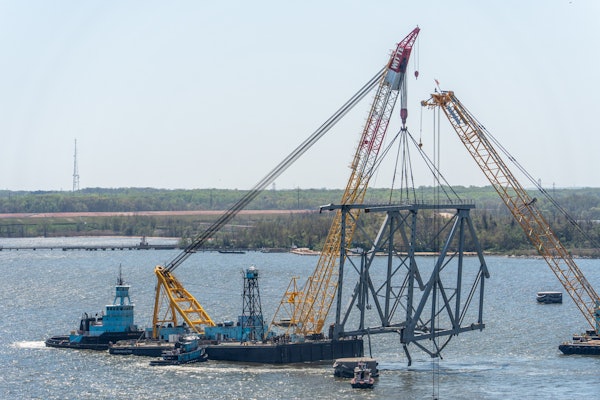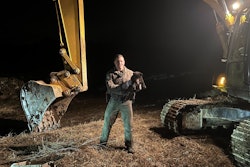Tim Filiatreau’s farming background made going into construction a natural progression. He liked the outdoor nature of the work – “you couldn’t get me to work inside to save my soul,” he now laughs – and this affinity prompted his rise from shoveling dirt to general superintendent with a local construction firm.
“I learned a lot while I was there and I worked hard,” Filiatreau says. Gaining so much responsibility, however, eventually gave him the itch to go out on his own. “I felt since I was worrying about it all anyway, I might as well worry about my own company,” he says. So in April 1997, with his father Joe Filiatreau as an initial silent partner, Filiatreau started Filcon Construction.
The industry contacts he’d made in the 11 years he worked with his previous employer proved invaluable. He immediately starting getting invitations to bid, and landed a church site development job, taking out rental purchase options on a dozer and backhoe to get the machines he needed.
Since Filiatreau had to concentrate on both getting business and getting the job done, 70- to 80-hour weeks were common. He knew the work backwards and forwards but found he had some knowledge gaps, especially when it came to estimating. “While I worked side-by-side with the estimator at my former company, I’d never really put the numbers together, so it was a challenge. But if I had any questions, I could call my former co-worker and he was more than glad to answer them. I really appreciated his help.”
One early disruption turned out to be a blessing. Filiatreau’s wife, Julia, was laid off, right when the two were depending on her job to carry their health benefits. The result, however, allowed her to devote her fulltime energies to the fledging company’s payroll and accounting, providing critical assistance. (She now concentrates on the couple’s two children, Thomas and Ellen.)
Most clients in the early days were general contractors. Today the client base is primarily made up of housing and commercial real estate developers, including Canfield Development, which builds high-end home sites. “I’ve been in this business for 30 years and dealt with probably 1,000 contractors and subcontractors and Tim’s at the very top,” says Steve Canfield, owner, Canfield Development.
Getting people’s attention
Filcon Construction has six crews and about 30 employees. The company pays a benefit package that Filiatreau places in the upper 90th percentile for the area, including 100 percent health insurance for individuals after working 90 days. “I’m a stickler for not wanting turnover,” he says. “I think it makes a difference in my business.”
He takes an interesting approach to promoting the employee behavior he wants. “Money gets people’s attention,” Filiatreau says. Every quarter he sets aside $125 for each hourly employee, telling them they’ll get the full amount at the end of the quarter if they work safely. But each time they’re seen without a hard hat, using a saw without safety glasses on, entering an unsafe trench, or any other unsafe practices, $25 gets deducted from the $125. And if Filiatreau concludes that someone abused or neglected a machine – such as the time a worker threw a dirt clod trying to get a truck driver’s attention and cracked a windshield – that person is subject to losing the entire $125.
When Filiatreau first put the program in place, some asked, “what if we lose all our money?” “I told them if that happened we’d have to look at their future employment here,” he says dryly. But most importantly, Filiatreau says the bonus has had the desired effect: employees are abiding by the rules and keeping their money.
Recruiting tool
Filiatreau views keeping late-model equipment as an employee recruiting and retention tool. If a good operator is running 10-year-old equipment at another company, then the opportunity to run a 3-year-old machine at Filcon Construction might be an enticement.
In addition, a few of his superintendents run company crew cab trucks, in part so they can carry their crews to jobs in Jefferson County, sometimes more than 50 miles away from the company’s rural Cox’s Creek, Kentucky, office.
On average, Filcon buys about three to four machines a year and usually runs its primary machines between 8,000 to 10,000 hours before trading them in. “My philosophy is when we go to work, I want to work,” Filiatreau says. “I don’t want four guys standing around because a machine is down. Even though that means making machine payments, it’s an approach that’s worked for us. We’ve got to keep things moving.”
This is an attitude that gains attention. “Tim has a strong reputation for meeting customer’s deadlines,” comments Mark Mathis, with vendor Hughes Supply.
Another part of his philosophy is paying machines off quickly – Filiatreau won’t go past 48-month financing, and if the machine has been on a rental purchase option, the maximum is 36 months.
To support this approach, Filcon has three fulltime mechanics, adding one last year. The additional mechanic freed up his chief mechanic to turn fewer wrenches and take a more proactive maintenance approach to the company’s 30-piece fleet, which includes rollers, dozers, articulated trucks, excavators and rigid-frame trucks.
In January 2005, Filcon bought its first GPS system. At first, Filiatreau found the initial price hard to swallow, but was so amazed with the results he bought two more systems within six months of the initial buy. “It’s given us a huge benefit, particularly when we put in patio home sites,” he says. “There’s no grade stakes, and your guys aren’t stopping to check grade.”
Above it all
Filiatreau has gained a pastime that puts him above it all, getting his private pilot’s license in 2006. He likes the serious nature of flying – that it involves careful attention to detail; it puts him in another frame of mind.
But his feet are firmly on the ground when it comes to the daily demands of running Filcon Construction. “You’ve got to stay in the middle of your business,” Filiatreau says. “I visit every one of my jobs almost every day. I see every bid that goes out of here. I’m in here about an hour before the superintendents get in. I believe you’ve got to be hands on.”









